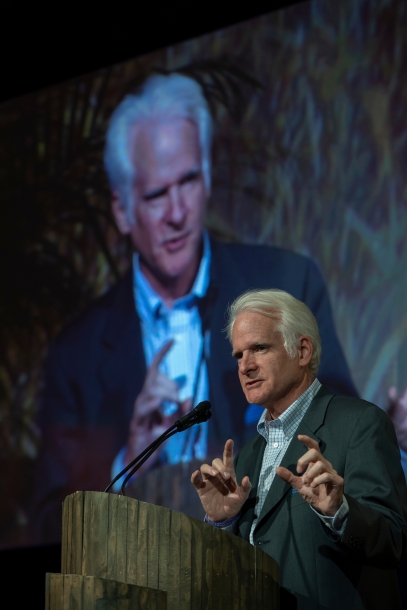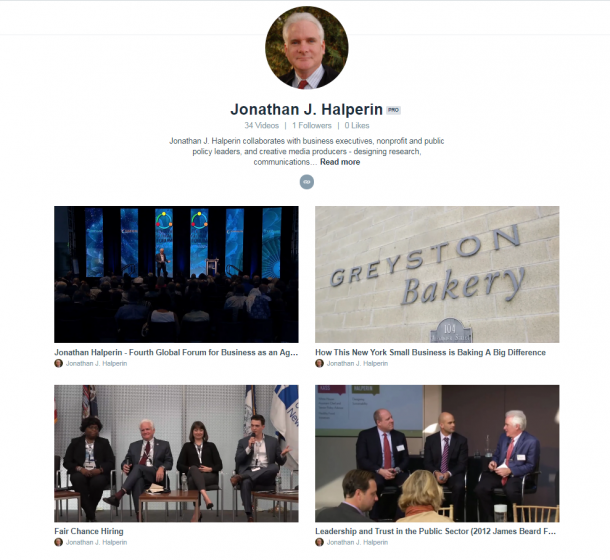You are here
On Purpose and Profit
Much has been written since Peter Drucker observed that “profit is not the purpose of business, but rather the test of its validity.” Yet, many corporate leaders still wonder both what purpose looks like operationally and whether it really generates value. Recently, a host of firms have sought to unpack this challenge: from E&Y and Accenture to Sustainable Brands, Conscious Capitalism, Ogilvy, and the Arthur W. Page Society.
For some executives, the sustainability agenda and its cousin, corporate social responsibility, remain challenges. For others, carbon disclosure remains problematic. But if Unilever CEO Paul Polman is right that purpose-driven brands within Unilever’s $61 billion ecosystem are growing “50% faster than the rest,” then brand managers, board members, investors and executives all need to quickly get their heads around this next phase of corporate evolution.

To advance the conversation, let’s first take a quick look in the rear-view mirror to understand how we arrived where we are today.
- In 1602 the Dutch East India company was chartered and granted a trading monopoly across a vast area of the Indian Ocean and southern Africa.
- In 1811 New York State passed the first statute facilitating the formation of limited liability manufacturing operations, a landmark event in defining corporate form.
- In 1889 Andrew Carnegie published “Gospel of Wealth,” imploring his wealthiest peers to share their wealth to improve society – a precursor to the 2010 Giving Pledge launched by Bill Gates and others at the urging of Warren Buffett.
- Fast forward to 2012 and Greyston Social Enterprise becomes the first “benefit corporation” to be registered in New York State, identifying Open Hiring™ as the social mission that it would pursue on par with its fiduciary responsibilities.
While humans have been bartering and trading for a very long time, corporate form as we know it today is relatively new. And the current way we practice philanthropy in the United States is also a modern construct. The typical pattern involves, first, the accumulation of great wealth through commerce and then some of that wealth being returned to society to meet various social needs.
It is this fundamental sequencing – extraction of profits followed by giving back – that is challenged by purpose-driven corporations. In the case of Greyston, the scale of profit-taking is moderated by balancing the necessity to not only generate profits but to also achieve a social purpose at the same time. Benefit corporations bring purpose inside the corporation, thus fundamentally changing its culture.

Greyston’s two-part mission is to create thriving communities and produce delicious brownies. To this end, it operates a world-class bakery in Yonkers, NY, baking 35,000 lbs. of brownies a day for Ben & Jerry’s, and for sale in retail markets. The kicker is that the Greyston bakery production line is staffed entirely of people brought into the mainstream economy through Open Hiring™. Anyone who wants a job is offered the opportunity to experience the dignity of work at Greyston: no questions asked, no resumes, no references, no background checks. (Please see this link for more on our work with Greyston).
In codifying this duality of profit and purpose as equally important we enter an entirely new stage of corporate evolution. Purpose is where self-interest and service meet. Survival of the fittest, in the jungle, and profit maximization, in competitive markets, have in common what Chris Houston identifies as the fatal flaw of panarchy. In his provocative book, For Goodness Sake (with Jordan Pinches), Houston extrapolates from systems analysis and ecology to set forth the panarchy principle: any system designed exclusively to optimize just one variable is self-limiting precisely because single variable optimization eventually destabilizes the system.
BCorps are among a few new forms of corporate structure designed to transform business from the inside, rather than through external regulation. These new corporate forms are early efforts to rewrite the rules and codify the opportunities and obligations for corporations to create value for everyone, beyond returns for shareholders. Tempering short-term profit maximizing behavior with the creation of long-term social value benefits may enable capitalism to avoid panarchy.
Such mission-drive corporations now operate in the US across virtually all sectors of the economy – from brownies to banking. The Co-CEO of Beneficial State Bank, Kat Taylor captured the importance of this evolution in her remarks congratulating Greyston on its 35-year history as a purpose-driven commercial bakery: “I know there’s this popular notion that somehow the capital markets were put here by some cosmic force, and they’re perfect and universal and they always produce the right outcomes. But they’re actually just a series of rules that we human beings wrote….”
While legal license to operate is still granted through government agencies (as it was in 1602), the more important and broader issue for companies today is around social license to operate. When the purpose and behavior of a corporation is fundamentally extraction – mining the environment, harvesting time and talent from employees, maximizing profit over all else, squeezing suppliers and vendors – then it is not surprising that over time discontent bubbles forth. When the richest 10% of the population own 88% of global assets (according to Credit Suisse), the system spawns the seeds of its own destruction.
Minimal licensing requirements, social and regulatory, will not going to forestall short-term profit taking or panarchy. Licensing is, after all, the low bar of corporate behavior. Rules requiring placards in elevators, anti-discrimination posters in break rooms, safety codes on wet floors are the absolute minimum. “Do no harm” may be a useful guide for doctors, but does not take a business very far forward in pursuit of higher social purpose.
Beyond licensing and compliance, and recognizing that competition is fierce, how then are corporations finding competitive advantage in purpose – and simultaneously redefining what it means to be a business? Watch this space.

- jonathan.halperin's blog
- Log in or register to post comments

